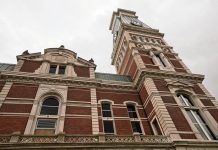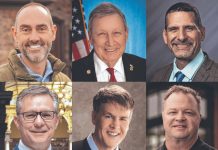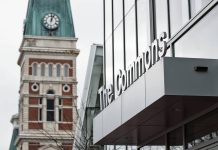
A bit of Columbus’ recent past nudged the leader of the Columbus/Bartholomew County Area NAACP Branch to be a part of city’s present challenges — and its most recent high-profile moment of racial justice on Thursday.
A crowd estimated at anywhere from 700 to 1,000 people gathered at Columbus City Hall’s plaza steps and lawn and the surrounding area for a solidarity rally organized by the NAACP chapter, the local African American Pastors Alliance, and the Justice Resource Center of Columbus Indiana.
The crowd was among the largest of any gathering that location in the past 25 years, second only perhaps to early National Day of Prayer crowds boosted by as many as 200 to 300 students brought in by teachers from area Christian schools.
Olisa Humes, the local NAACP president, acknowledged that a couple local leaders who came before her, plus general public indignation over the highly publicized death of George Floyd, helped pave the way toward Thursday’s outpouring. And, the pastors alliance has been working on behalf of African Americans for more than 15 years, with much of that time under the radar until about five years ago.
[sc:text-divider text-divider-title=”Story continues below gallery” ]
One past leader acknowledged by Humes was Brittany King, who led the Columbus Black Lives Matter chapter that formed in July 2016 and disbanded in December 2018 after she moved to New York.
“Shortly after I moved back to Columbus, what she began doing struck me,” Humes. “Brittany re-energized my passion for social justice.”
From the podium Thursday, Humes honored King, who was standing near the front of the crowd in a T-shirt with the hand-lettered message of one of Floyd’s last phrases: “I can’t breathe.”
King and a group of other Black Lives Matters officers were the first local group to specifically and consistently draw attention to police killings of unarmed black men across the country.
The chapter’s mission focused “on peaceful protest to injustices to invoke necessary changes locally, and to assist with national reform to the criminal justice system,” according to its former Facebook page at Black Lives Matter of Columbus IN.
The day before Thursday’s rally, King mentioned on Facebook that she was skeptical about people suddenly posting quotes from the Rev. Martin Luther King as their status amid the national uprising after George Floyd’s death.
But then King looked over Thursday’s crowd of mostly white faces with amazement. The local Black Lives Matter group was still picking up support locally when it disbanded, with its biggest meeting being nearly 200 people at a full Unitarian Universalist Congregation of Columbus building in 2017.
Humes said Thursday’s large crowd was a sign of outrage, especially among younger people, most of whom generally have not attended other local rallies on topics such as stopping religious hatred.
“I feel like we have sold today’s young people a dream that everyone is created equal — that skin color doesn’t matter,” Humes said. “But, they keep seeing this violence (against blacks) on the news. And they see that that idea of equality is not really true. And they’re extremely fed up.”
King saw the crowd as one of many steps needed among changes such as nationwide police and other reform.
“I was blown away by the number of people who came out,” King said of last week’s rally. “(But) we have to remember that the (ultimate) action is not coming to this rally. These black organizers are saying that we need a fundamental change in law.
“And it’s not an emotional thing that changes fundamental law. But fundamental law is what white supremacy is rooted in.
“And that’s where it will die if we get out there and vote for the right people from the local levels to the presidency. And I’m going to try to stay optimistic (about change).”
A second person who led the local fight for equality and racial justice for more than 20 years was Gwen Wiggins, a former long-time president of the local NAACP. Wiggins, who first moved to Columbus in 1963 to work for then-Cummins Engine Co., now is retired and lives in Indianapolis.
“She always has been a force,” Humes said of Wiggins.
But Wiggins acknowledged that getting local support from blacks for the NAACP’s work sometimes was as tough as getting support from whites and others. In the early 2000s, at the chapter’s annual banquet at Holiday Inn where a national NAACP official was the keynote speaker, a crowd of fewer than 50 people attended.
“I wish more people had paid attention,” Wiggins said.
Though Wiggins faced frustration, the speaker assured her and others in his public remarks that such measured interest on racial issues was an issue nationwide at the time.
But Wiggins always told people that the NAACP continued to be relevant and needed “because there always will be racial injustice and there is always such work to be done.” She repeated this regularly even after Barack Obama was elected president.
Wiggins said high-profile community leaders ranging from former Cummins Engine Co. Chairman J. Irwin Miller, who helped organize the 1963 March on Washington, to Cummins executives such as Joseph High and Larry Whaley, have helped the local cause of racial justice tremendously.
“I believed even back then (after Obama) that the NAACP was so badly needed,” she said, “that I became a life member.”
[sc:pullout-title pullout-title=”Where to learn more” ][sc:pullout-text-begin]
To learn more about the NAACP, visit naacp.org.
To learn more about Black Lives Matter, visit https://blacklivesmatter.com/.
[sc:pullout-text-end]




